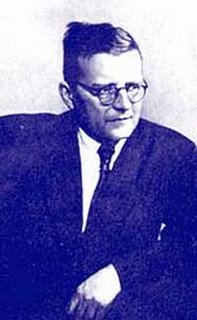 Yesterday I had the thrill of attending a Shostakovich matinee at Avery Fisher Hall. Valery Gergiev conducted the Kirov Orchestra, straight outta St. Petersburg, in a performance of the 8th and 13th symphonies. This was the final concert in Gergiev’s 2006 series: all 15 symphonies in the 100th birth year of the great, unknowable Dmitry Shostakovich (1906-1975).
Yesterday I had the thrill of attending a Shostakovich matinee at Avery Fisher Hall. Valery Gergiev conducted the Kirov Orchestra, straight outta St. Petersburg, in a performance of the 8th and 13th symphonies. This was the final concert in Gergiev’s 2006 series: all 15 symphonies in the 100th birth year of the great, unknowable Dmitry Shostakovich (1906-1975).
Gergiev conducted without a podium, standing directly on the stage in front of the orchestra. The floor began to creak under his feet as the concert wore on, but the distraction was mild. It even added to the dramatic effect.
The 8th, composed in 1943, is extraordinary. It begins with an achingly slow first movement lasting nearly half an hour. Throbbing heavy-metal eighth notes announce the third movement, starting in the violas but eventually coursing through the trombones and even the timpani. But the piece ends with a sublime whisper. It’s a World War II symphony, but more complex and ambivalent, and less overtly nationalistic, than the 7th (“Leningrad”), which I heard earlier this year at Carnegie Hall, performed by the Royal Concertgebouw Orchestra of Holland under the baton of Mariss Jansons. (Last month I had the chance to hear Lorin Maazel conduct the 5th symphony, along with the first cello concerto.)
The 13th, subtitled “Babi Yar” and composed in 1962, is what is known as a song-symphony, with poetic texts by Yevgeny Yevtushenko. An enormous male bass choir filled the stage behind the orchestra. Nikolai Putilin, baritone, was the soloist. The first movement is dedicated to the victims of the Babi Yar massacre of 1941, perpetrated in Ukraine by the occupying Nazis. Even during the Khrushchev-era thaw, this was a touchy subject. The Soviets were loath to memorialize specifically Jewish suffering, and even less inclined to acknowledge the persistence of anti-Semitism in Russia. Yevtushenko’s text walks a fine line, pledging solidarity with Jews and mentioning Dreyfus and Anne Frank but also appealing to Russian nationalism and even communism:
The “Internationale” — let it thunder
when forever will be buried
the last of the anti-Semites on earth.
There is no Jewish blood in mine,
but I am adamantly hated
by all anti-Semites as if I were a Jew
That is why I am a true Russian!
The remaining four movements are seemingly unrelated but subtly political. One deals with the subversive impact of humor, another with the sacrifices of Russian women. “Fears” confronts the dying legacy of Stalinism. “Career,” an idiosyncratic tribute to Galileo, seems loaded with autobiographical significance for Shostakovich, as someone who continually fell in and out of favor with the Soviet regime. (See this page for endless discussion.)
The authorities had plenty of problems with “Babi Yar” and tried unsuccessfully to scuttle the Moscow premiere. The minister of culture reportedly phoned to ask the conductor, “How is your health? Is there anything that might prevent you from conducting tonight?” According to Paul Schiavo’s program notes, audiences responded warmly but the symphony met with “an organized campaign of silence” after Brezhnev came to power in 1964.
This music is heavy. And with all those low male voices, it can get pretty grim. It’s Russian, after all. But it is imaginative beyond belief. To hear two relentless, hour-long barrages of creativity, written some 20 years apart, played by a Russian orchestra and conducted by one the greatest living maestros: this was an experience.
Comments are closed.
